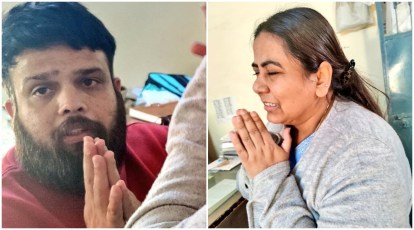A horrifying case of domestic violence and brutality has emerged from Rajgarh district in Madhya Pradesh, where a woman was subjected to unspeakable cruelty by her husband and in-laws. The perpetrators reportedly burned her with a hot iron rod and rubbed chili powder in her genitals, blaming her for a situation involving another man misbehaving with her. The incident has sparked outrage, raising serious concerns about the safety and dignity of women within the domestic sphere.
The Disturbing Incident
According to police reports, the woman was accused by her in-laws of impropriety after they witnessed another man allegedly misbehaving with her at their residence. Instead of addressing the behavior of the accused man, the woman’s in-laws and husband resorted to inhumane acts of violence. In a chilling act of brutality, they burned her private parts with a hot iron rod and compounded the assault by applying chili powder to her injuries.
The woman, who has not been named for privacy reasons, suffered severe physical and emotional trauma. Following the incident, she managed to report the case to the local police, who have now registered charges against the in-laws and the alleged molester.

Legal Action and Police Investigation
The police in Rajgarh acted promptly upon receiving the complaint and have registered a case against all involved parties, including the in-laws and the man accused of misbehavior. Authorities have stated that they are conducting a thorough investigation to ensure justice for the victim.
A senior officer handling the case emphasized that violence of this nature cannot be tolerated under any circumstances. “This is a clear violation of human dignity and the law. We will ensure that the culprits face strict action for their heinous acts,” the officer remarked.
Domestic Violence in India: A Widespread Concern
This case highlights the pervasive issue of domestic violence in India, where thousands of women suffer abuse at the hands of family members every year. Despite legal frameworks such as the Protection of Women from Domestic Violence Act, 2005, cases like this underscore the challenges in enforcing these laws and protecting vulnerable women.
Key Statistics:
- Reported Cases: According to the National Crime Records Bureau (NCRB), over 100,000 cases of cruelty by a husband or relatives were reported in 2023. Experts believe the actual number may be significantly higher due to underreporting.
- Cultural Barriers: Many women do not report abuse due to societal stigma, lack of financial independence, or fear of retaliation from family members.
- Judicial Delays: Even when cases are reported, delays in the judicial process often prolong victims’ suffering.
Public Outrage and the Need for Change
The Rajgarh incident has triggered widespread outrage on social media, with citizens and activists demanding swift justice for the victim. Women’s rights organizations have condemned the act, calling for harsher penalties for perpetrators of domestic violence to deter such incidents in the future.
Activist and lawyer Renu Sharma commented, “This case is a reminder of the deep-seated patriarchy and misogyny in our society. Women are not just vulnerable outside their homes but also within the so-called safety of their families. The law must act decisively to send a strong message.”

A Call for Action
Incidents like this underline the urgent need for:
- Stronger Enforcement of Laws: The implementation of existing laws must be strengthened to ensure that victims receive timely justice.
- Awareness Campaigns: Society needs to be educated about the rights of women and the unacceptability of violence in any form.
- Support Systems: Helplines, counseling services, and safe shelters must be made more accessible for victims of domestic violence.
While laws can provide a framework for justice, societal attitudes and cultural norms must evolve to ensure that women can live with dignity and safety. This shocking case from Madhya Pradesh serves as a grim reminder of the work that remains to be done. Women’s safety should not be a privilege but a fundamental right.

